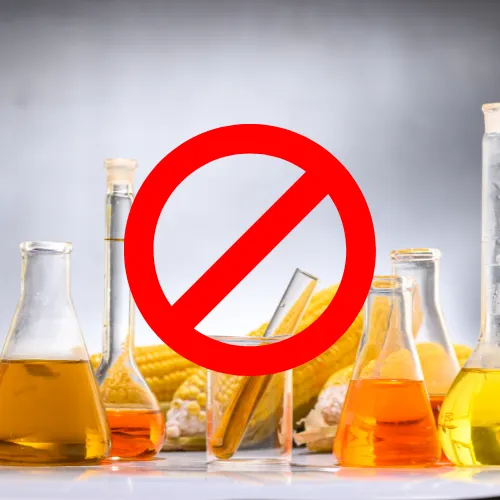2632 Tree Crown Schertz TX 78154
2632 Tree Crown
Schertz TX 78154
Blogs
Blogs

What You Need to Know About High-Fructose Corn Syrup (HFCS)
High-fructose corn syrup (HFCS) is a type of sweetener commonly found in processed foods and drinks. It’s been linked to several health problems and is a major contributor to the rising rates of obesity and chronic illnesses. Here’s why you should pay attention to HFCS and how to avoid it.
1. What is High-Fructose Corn Syrup?
HFCS is a chemically modified form of corn syrup. It’s made by converting some of the glucose in corn syrup into fructose, making it much sweeter and cheaper than regular sugar. Manufacturers use HFCS because it improves the taste, texture, and shelf life of processed foods.
2. Why Should You Avoid HFCS?
It Overloads Your Liver. Unlike glucose, which your body uses for energy, fructose is processed only in the liver.
Consuming too much HFCS overwhelms your liver, leading to:
☑️Fat storage (increased risk of fatty liver disease).
☑️Higher production of triglycerides, which can raise your risk of heart disease.
☑️Leads to Excess Fat Storage — HFCS promotes fat storage more than regular sugar. It stimulates the production of fat in the liver and increases abdominal fat, the most dangerous type of fat for your health.
☑️Disrupts Hunger Signals — HFCS doesn’t signal your brain to feel full, unlike whole foods with fiber or protein. This can lead to overeating and cravings, making it harder to maintain a healthy weight.
☑️Increases Risk of Chronic Diseases. Studies link HFCS consumption to:
⭕Obesity
⭕Type 2 diabetes
⭕Heart disease
⭕Gout (from elevated uric acid levels)
⭕Triggers Inflammation
HFCS contributes to chronic inflammation, which is a root cause of many health issues, including joint pain, digestive problems, and autoimmune conditions.
3. Common Foods That Contain HFCS
HFCS hides in more foods than you might expect. Watch out for these:
- Sugary Drinks: Soda, energy drinks, and sweetened teas.
- Snacks: Candy, granola bars, and some flavored chips.
- Condiments: Ketchup, barbecue sauce, salad dressings, and syrups.
- Baked Goods: Bread, muffins, cookies, and pastries.
- Dairy Products: Sweetened yogurt, flavored milk, and ice cream.
- Processed Foods: Frozen dinners, instant oatmeal, and canned soups.
4. How to Spot HFCS on Labels
HFCS often hides under different names, so when reading labels, look for:
⭕High-fructose corn syrup
⭕Corn syrup solids
⭕Glucose-fructose syrup
⭕Isoglucose
💡 Pro Tip: Ingredients are listed in descending order by weight, so if HFCS is near the top, that food contains a lot of it.
5. Tips for Avoiding HFCS
☑️Eat Whole Foods: Focus on fresh fruits, vegetables, whole grains, and lean proteins.
☑️Cook at Home: Homemade meals let you control what goes into your food.
☑️Read Labels Carefully: Always check for HFCS and its aliases in packaged foods.
☑️Choose Natural Sweeteners: Opt for alternatives like honey, maple syrup, or stevia (in moderation).
☑️Stay Hydrated with Water: Replace sugary drinks with water, herbal tea, or sparkling water with a splash of citrus.
6. Raising Awareness
It’s easy to consume HFCS without realizing it, especially with its prevalence in everyday products. Educating yourself and others about the dangers of HFCS is the first step toward healthier choices.
Start small: Check the labels of three items in your pantry or fridge today. If they contain HFCS, consider swapping them for healthier alternatives. Your body—and your long-term health—will thank you!
For more detailed information on HFCS and its health implications, you can refer to resources like the Cleveland Clinic's article on avoiding the hidden dangers of high-fructose corn syrup.
CLEVELAND CLINIC HEALTH ESSENTIALS
Hi! We're A Local Gym In Schertz, TX
Established in 2022, it’s our mission to help people in Schertz, TX and surrounding areas get fit, stay healthy, and live life on their terms without fitness being an obstacle at Freedom Body Fitness Gym!
Schedule Your FREE In-Person Visit Today


Important Info
working hours
By Appointment Only.
Mon-Wed-Fri
5am- 10am
4pm- 7pm,
Tue - Thur
7AM- 10AM,
4PM- 7PM




